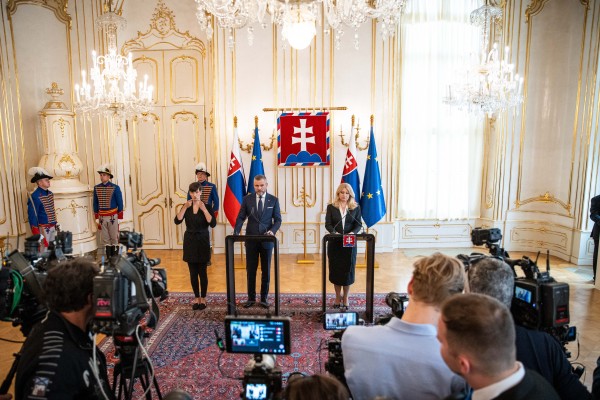An Austrian investigative news platform that documented poor conditions in asylum-seeker housing across Austria was ordered Monday to pay nearly €2,000 for trespassing after the landlord of one of the housing sites brought suit.
A regional court in the eastern Austrian state of Burgenland confirmed a lower court’s ruling that the platform, Dossier, had violated the private landlord’s property rights when its reporting team visited asylum seekers in their rooms without obtaining the landlord’s permission.
The Dossier team visited the property, in the town of Pama, in October 2014 to ascertain whether circumstances had improved following an initial 2013 evaluation that revealed apparently filthy conditions, including extensive mould in asylum seekers’ bedrooms. Dossier had identified the property in Pama as one of the “20 worst” sites out of the more than 100 it visited across the country in 2013. The landlord denied the reporting team permission to revisit, but the team entered the property after receiving permission from the asylum seekers themselves. Dossier later published the results of the reevaluation, which it said showed the landlord had only superficially addressed – and in some cases merely covered-up – the “hazardous” conditions.
The lower court found that the permission granted by the site’s residents – the asylum seekers – was insufficient. It noted that according to the terms of a contract that the landlord had signed with the Burgenland state government, by which the landlord would house a contingent of asylum seekers in return for compensation, the landlord was to refuse visitation to all persons except government officials. All other prospective visitors would be required to first seek permission from the state refugee agency.
According to the court, the Dossier team had decided “for reasons of journalistic tactic” in all of its site visits to be invited in by the asylum seekers and only later to confront the landlords with its findings.
Notably, neither court referred in its respective ruling to press freedom or to the public’s interest in the results of Dossier’s investigation. Nor did any party, including the landlord, contest the results’ accuracy. For its part, the first instance court further observed that “no person from the [reporting team] entered the [landlord’s] private rooms. None of the asylum seekers living in the house was bothered by the presence of the [reporting team]”.
Florian Skrabal, Dossier’s editor-in-chief, told the International Press Institute (IPI) in a telephone interview that he was “surprised that such a ruling is possible in Austria”. He characterised the suit as an attempt to prevent Dossier from returning to reevaluate the conditions in Pama and added that the site was evaluating whether it would be able to proceed with its research on conditions at other housing sites in light of the court’s ruling.
Skrabal described Dossier’s investigation as lying squarely in the public interest, emphasising his view that the landlord, in housing the refugees, was carrying out a “public function” using public funds. In-person visits by journalists, he said, were indispensable to evaluating the conditions in which the asylum seekers were being held. Skrabal pointed to an interview last year in which the head of an Austrian humanitarian organisation permitted to visit asylum housing sites in Burgenland stated that his organisation was allowed to only provide social care and generally only in communal spaces. If representatives of the organisation sought to enter and evaluate the asylum seekers’ living spaces, the landlords would “throw them out”.
IPI Director of Press Freedom Programmes Scott Griffen said the narrow perspective with which the Burgenland courts had decided the trespassing claim was cause for concern.
“It is unquestionable that Dossier in this case conducted factual reporting on a matter of clear public interest,” Griffen commented. “It is therefore unclear to us why neither court at least sought to balance the landlord’s property rights claim with the right of the public to information not only on the treatment of asylum seekers in Austria generally, but also on the manner in which public funds were being spent.
“The court rulings refer to Dossier’s ‘journalistic tactic’ and suggest that the site could have obtained the information otherwise, including by acquiring official permission for the visit. But that is far from clear. The fact that an ‘officially sanctioned’ visit may lead to a different or even skewed impression of conditions is obvious. It is worrisome that the courts do not appear to have evaluated Dossier’s actions in the context of the situation as a whole, including the potential for this ruling to chill reporting on asylum conditions more generally.”
Since the summer, the refugee crisis has dominated public debate in Austria. The federal government has laboured to find sufficient accommodation for an expected 80,000 asylum applicants in 2015, following nearly 50,000 asylum applications in the period 2013-2014. After humanitarian and human-rights groups, aided by media investigations, sharply criticised conditions at the over-capacity primary holding centre in Traiskirchen, lawmakers ushered through a constitutional change that significantly increased the ability of the federal authorities to establish housing sites against the will of state and municipal authorities.
Dossier’s initial 2013 investigation, carried out even before this year’s upsurge in asylum applications, was conducted in the states of Burgenland, Lower Austria and Salzburg. According to Dossier, while the 2014 follow-up revealed significant improvement in Lower Austria and little change among the relatively better conditions in Salzburg, “serious deficiencies” remained in Burgenland. Five of the eight “worst” housing sites, Dossier stated, were found in Burgenland, including the site in Pama.



